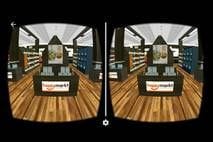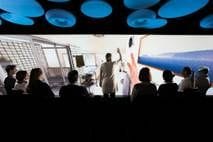How is this - a virtual immersion in the disease?
With the help of simulators, a healthy person can experience for themselves what autism, dementia and other disorders are.
Virtual immersion in the disease is a relatively new thing, but very significant. Virtual reality (VR) technologies are still more often used for training doctors, for rehabilitation. Trying to become deaf, blind, and living for hours in true dementia is sometimes more important than reading a mountain of medical books. We have chosen five simulators with which everyone can try the disease. Most of them exist in two versions: for a computer and for a smartphone with virtual reality glasses.
Scenes with dementia Photo: A Walk Through Dementia
Photo: A Walk Through Dementia
A virtual reality program developed by the British Alzheimer’s Research UK turns a user into an elderly lady with obvious signs of dementia. Her life is given to us in three micro-plots: "In the store", "The road home", "My daughter came to visit". You can use the mouse to control your movements, but it’s not easier.
Another dementia simulator from the Dementia Australia Association is only available at the organization’s office. There is a 2 × 10 meter screen, speakers to simulate tinnitus and moreobjects that complement the virtuality: the floor for stumbling, sink and toilet that do not differ from each other and other attributes of the difficult life of an elderly person. For a more complete immersion in his life are also used special gloves that distort the sensations and interfere with the movement of the fingers, shoes with uneven insoles, glasses with the effect of blurring and distortion. Even for caregivers who have worked with the elderly for many years, immersion in a new reality is a shock. Photo: Dementia Australia Deaf
Photo: Dementia Australia Deaf
technology Deaf
simulatorfrom Starkey Hearing Technologies is not the same as just plugging your ears. The quality of hearing here has several gradations. And the video, so that you better feel what is happening, puts you in different situations: just a conversation, a business meeting, a restaurant, a shop. It is very scary to feel how the hearing gradually goes, and with it the connection with life. The grandson says something enthusiastically, you don’t understand anything. But we must react somehow, he is waiting! Photo: abc.net There
Photo: abc.net There
are many hearing loss simulators. For example, this , but here the effect of presence is much weaker.
Depression Fantasy Depression
Simulatorcreated by Parallax Visions two years ago, the project is more conceptual than medical. How to cause depression in a healthy, cheerful person without the use of drugs? People in a state of depression see the same as others, but are not happy about anything - it is unclear how to imitate it. Parallax Visions did it boldly and unexpectedly. It’s like a real depression: the longer you stay in this state, the worse you are. Pop-up advice: "Keep your head up, friend!" "Above your head, my friend!" - a great example of what not to say to a person in a state of depression. Photo: Parallax Visions
Photo: Parallax Visions
The Tale of Lost Vision
The American company VersantHealth has developed a program which shows how people with cataracts, glaucoma, macular degeneration (gradual loss of vision, starting from the center of the visual zone), diabetic retinopathy (dark spots in the field of view due to retinal vascular damage) and other eye diseases. Photo: VersantHealth There
Photo: VersantHealth There
are many simulators of poor eyesight. Two British engineers from the University of Reading have dedicated a great deal of work to this .
Schizophrenia: Voices and Images
of Janssen Pharmaceutica, the "daughter" of Johnson & Johnson, is involved in many treatments for schizophrenia. No wonder this company created a simulation program back in 2008. You find yourself at a doctor’s office, but you are haunted by schizophrenic visions and voices. The figure at the table suddenly bends down, stretches his neck, and in the middle of his forehead he opens a third eye. People react differently: someone throws glasses in fear, and the most persistent complain that their voices were distracted, it was impossible to focus on the doctor’s words and the reception was in vain. It should be noted that people with schizophrenia themselves say that their images and visions are much more complex than those we can see with the help of virtual technology.
You find yourself at a doctor’s office, but you are haunted by schizophrenic visions and voices. The figure at the table suddenly bends down, stretches his neck, and in the middle of his forehead he opens a third eye. People react differently: someone throws glasses in fear, and the most persistent complain that their voices were distracted, it was impossible to focus on the doctor’s words and the reception was in vain. It should be noted that people with schizophrenia themselves say that their images and visions are much more complex than those we can see with the help of virtual technology.
Read also: See My World: look at the world through the eyes of visually impaired people
SUPPORT PROJECTS AND SUPPORT FUNDS
Virtual immersion in the disease is a relatively new thing, but very significant. Virtual reality (VR) technologies are still more often used for training doctors, for rehabilitation. Trying to become deaf, blind, and living for hours in true dementia is sometimes more important than reading a mountain of medical books. We have chosen five simulators with which everyone can try the disease. Most of them exist in two versions: for a computer and for a smartphone with virtual reality glasses.
Scenes with dementia
 Photo: A Walk Through Dementia
Photo: A Walk Through Dementia A virtual reality program developed by the British Alzheimer’s Research UK turns a user into an elderly lady with obvious signs of dementia. Her life is given to us in three micro-plots: "In the store", "The road home", "My daughter came to visit". You can use the mouse to control your movements, but it’s not easier.
Another dementia simulator from the Dementia Australia Association is only available at the organization’s office. There is a 2 × 10 meter screen, speakers to simulate tinnitus and moreobjects that complement the virtuality: the floor for stumbling, sink and toilet that do not differ from each other and other attributes of the difficult life of an elderly person. For a more complete immersion in his life are also used special gloves that distort the sensations and interfere with the movement of the fingers, shoes with uneven insoles, glasses with the effect of blurring and distortion. Even for caregivers who have worked with the elderly for many years, immersion in a new reality is a shock.
 Photo: Dementia Australia Deaf
Photo: Dementia Australia Deaf technology Deaf
simulatorfrom Starkey Hearing Technologies is not the same as just plugging your ears. The quality of hearing here has several gradations. And the video, so that you better feel what is happening, puts you in different situations: just a conversation, a business meeting, a restaurant, a shop. It is very scary to feel how the hearing gradually goes, and with it the connection with life. The grandson says something enthusiastically, you don’t understand anything. But we must react somehow, he is waiting!
 Photo: abc.net There
Photo: abc.net There are many hearing loss simulators. For example, this , but here the effect of presence is much weaker.
Depression Fantasy Depression
Simulatorcreated by Parallax Visions two years ago, the project is more conceptual than medical. How to cause depression in a healthy, cheerful person without the use of drugs? People in a state of depression see the same as others, but are not happy about anything - it is unclear how to imitate it. Parallax Visions did it boldly and unexpectedly. It’s like a real depression: the longer you stay in this state, the worse you are. Pop-up advice: "Keep your head up, friend!" "Above your head, my friend!" - a great example of what not to say to a person in a state of depression.
 Photo: Parallax Visions
Photo: Parallax Visions The Tale of Lost Vision
The American company VersantHealth has developed a program which shows how people with cataracts, glaucoma, macular degeneration (gradual loss of vision, starting from the center of the visual zone), diabetic retinopathy (dark spots in the field of view due to retinal vascular damage) and other eye diseases.
 Photo: VersantHealth There
Photo: VersantHealth There are many simulators of poor eyesight. Two British engineers from the University of Reading have dedicated a great deal of work to this .
Schizophrenia: Voices and Images
of Janssen Pharmaceutica, the "daughter" of Johnson & Johnson, is involved in many treatments for schizophrenia. No wonder this company created a simulation program back in 2008.
 You find yourself at a doctor’s office, but you are haunted by schizophrenic visions and voices. The figure at the table suddenly bends down, stretches his neck, and in the middle of his forehead he opens a third eye. People react differently: someone throws glasses in fear, and the most persistent complain that their voices were distracted, it was impossible to focus on the doctor’s words and the reception was in vain. It should be noted that people with schizophrenia themselves say that their images and visions are much more complex than those we can see with the help of virtual technology.
You find yourself at a doctor’s office, but you are haunted by schizophrenic visions and voices. The figure at the table suddenly bends down, stretches his neck, and in the middle of his forehead he opens a third eye. People react differently: someone throws glasses in fear, and the most persistent complain that their voices were distracted, it was impossible to focus on the doctor’s words and the reception was in vain. It should be noted that people with schizophrenia themselves say that their images and visions are much more complex than those we can see with the help of virtual technology. Read also: See My World: look at the world through the eyes of visually impaired people
SUPPORT PROJECTS AND SUPPORT FUNDS